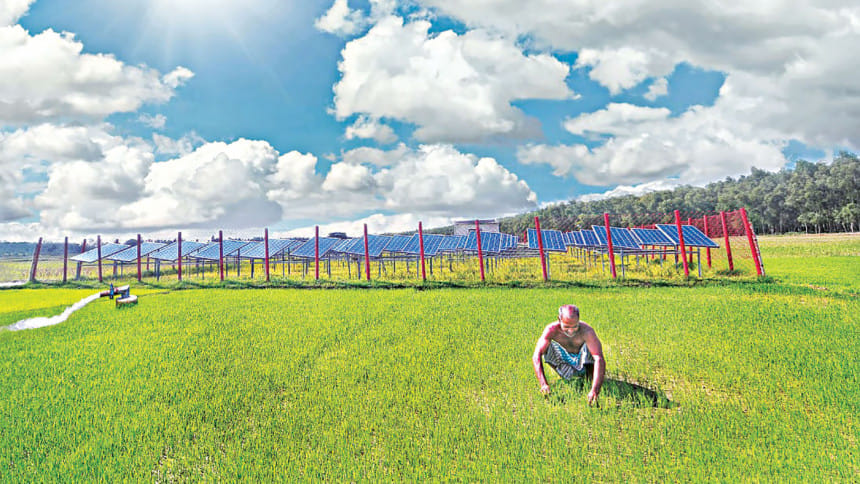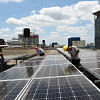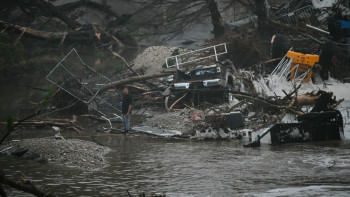Lighting the future with renewables

Around the world, countries are putting in extended industrious efforts to find ways to fight climate change and secure a prosperous future for the generations ahead. As people all over the world realise the environmental challenges we are experiencing, it is clear that using renewable energy holds the key to reducing the harmful impact of heavy fossil fuel reliance. Forward looking nations all around the world are demonstrating their responsiveness environmentally by utilising clean energy sources like wind, solar, water, and heat from the earth and driving their economies towards growth.
In the face of mounting energy challenges and the need for sustainable development worldwide, we stand on thin ice as of yet. Bangladesh is struggling with not having enough energy, coupled with economic worries, and the escalating imperative to proactively address climate change concerns although the light of a transformative solution lies within reach. By unleashing the possibilities renewable energy holds, Bangladesh can eventually overcome its energy problems as well as usher in a new era of economic growth and social empowerment.
On account of its geographical location and abundant sunlight, our country holds immense promise in accelerating mass usage of solar energy. A recent Jahangirnagar University study shows that Bangladesh has high potentiality of applying solar irradiation to generate electricity, as it absorbs average solar radiation of 4.0 to 6.5 kWh/m2 per day. This is capable of producing 1018 X 1018 J of energy daily. The study further reveals that only a meagre 0.11 percent of this high amount of solar energy is used to meet the country's primary energy consumption. These insights suffice to evince how we are an ideal candidate as a nation for large-scale solar power projects and yet, how far behind do we currently stand?

The potential for economic empowerment through renewable energy has graduated into a very promising prospect for another, although unfortunate reason, i.e., energy shortage in rural areas. At this point, we must pursue innovative, solution-oriented projects that harness the immense potential of sustainable energy. It is essential to acknowledge that the journey towards renewable energy in Bangladesh necessitates stronger commitment and accelerated action.
A "Smart" Bangladesh should consider implementing a comprehensive framework that incentivises the adoption of renewable energy. This framework could include financial incentives such as tax exemptions from incomes generated by individuals and businesses owing to using renewable energy solutions for both household and business purposes. Provisions should include subsidies for renewable energy equipment, as well as streamlined licensing procedures and priority access to financing opportunities. By creating a flourishing platform for renewable energy projects to yield fruitful outcomes, our country will foster an ecosystem where innovation thrives, attracting investment and expertise in the field.
That is why the benefits of renewable energy should extend beyond the environmental considerations. Because underserved communities, including women, farmers, and marginalised groups, often bear the brunt of energy poverty and limited economic opportunities. Renewable energy initiatives can offer a pathway to empower these communities and promote social inclusion. Moreover, such sustainable energy projects can facilitate access to clean water, healthcare, and education, improving the overall well-being and quality of life for underserved communities.
In addition to the prospects previously mentioned, when building a lasting renewable energy infrastructure is the vision, new job opportunities is the logical outcome. Across the entire value chain, from manufacturing and installation to operation and maintenance, we will have the opportunity to utilise our human capital and reduce unemployment towards a more humane future.
Establishment of renewable energy infrastructure will give us further leverage from the energy supply disruptions and unpredictable energy costs we now go through due to fossil fuel prices being subject to market volatility and geopolitical tensions. Impressively, as fuel sources (sunlight, wind, etc.) of renewable energy are free, this stability can enhance financial planning, reduce business risks, bring down import-dependency, and improve the affordability of energy for households as well.
Collective and promising efforts in this domain can potentially attract foreign investment, empower local industries, and create a skilled workforce in the renewable energy sector. The establishment of manufacturing facilities for solar panels, wind turbines, and other renewable energy components will again, generate employment opportunities, particularly for youth and workers in need of reskilling. Furthermore, the growth of renewable energy markets can lead to greater export opportunities, positioning Bangladesh as a regional hub for clean energy technologies and services as well.
It is now time for Bangladesh to pioneer groundbreaking projects that harness the power of the sun for enlightening wisdom as well. The imagination of remote villages where solar-powered digital learning centres illuminate young minds, transcending the limitations imposed by traditional energy sources should soon become an impactful reality. Such endeavours should create convenient access to education as well as expedite digital literacy programmes, so the beneficiaries have the competencies essential to thrive in an extensively interconnected world. Thus, the benefits of clean energy usage should be reflected through improved learning prospects for a much wider and inclusive community, bridging the digital divide and empowering the people of Smart Bangladesh to shape their paths ahead to more rewarding destinies.
The country and the people who hold the power to use it for good must take decisive initiatives to overcome existing obstacles and catalyse the transition to clean energy sources. The government, along with international development organisations, NGOs, and sustainability-oriented influential corporates have a vitally essential part to play in prioritising the allocation of resources and policy support necessary to facilitate the rapid adoption of renewable energy solutions. Above all, a constructive nation-building mindset through multi-directional innovation is a must behind all the endeavours to be pursued.
Considering all the prospects of innovation and growth we have by renewable energy's grace, these present opportunities for us to attract foreign funding and investments as well which shall meaningfully impact the nation's economy towards growth. By representing our sustainable energy possibilities promisingly, leveraging this prospect can open new avenues for financial support from international partners and organisations.
One good way to attract foreign funding is through enabling international climate finance mechanisms by creating mutually fruitful and motivating platforms. Global initiatives like the Green Climate Fund (GCF) and the Global Environment Facility (GEF) finance initiatives in developing countries for climate change mitigation and adaptation. Although we have already seen some light, strengthening our efforts further will allow us to tap further into these funds by developing well-structured and financially viable sustainable energy projects that stand successfully upon the objectives and criteria of these funding platforms.
Readying a solid and robust project pipeline is very important for Bangladesh to access these international sources of climate finance. An appropriately-formalised, well-organised, and expertly supervised series of programmes—involving the identification of priority areas for renewable energy development, realistic feasibility studies, and the development of compelling project proposals—should be the first item on our to-do list. These proposals should throw light on the socio-economic benefits, such as employment generation, energy access improvement, and reduction of greenhouse gas emissions, while addressing the specific criteria set by the funding principals.
Furthermore, Bangladesh can utilise public-private partnerships here as well to explore and attract foreign funding. By engaging with private sector giants, the government can leverage and rightly channel their financial resources, technical expertise, and market access to accelerate the deployment of clean energy projects. PPPs can help mobilise private investments as well as foreign fundings, enhance project efficiency, and drive through newer lanes of positive transformation having higher speed value economically.
However, a big challenge lies ahead for Bangladesh to actualise their foreign funding aspirations. That is, creating a predictable and transparent business environment. But, breaking this very barrier will ease the path for us to accessing external finances as this will instil confidence in foreign investors and increase the likelihood of securing the anticipated fundings.
Our success in capturing such financing opportunities under this new yet prospective dominion of energising the nation sustainably will reopen the gates of continued foreign funding which got narrowed after Bangladesh officially donned the medal of "middle-income country". And let's not disregard the benefits of reduced fossil fuel dependency.
The new belt of international partnerships we will be able to buckle through these funding will further contribute in simplifying our clean energy production procedures. These engagements will certainly facilitate technology and knowledge exchange as well, which will buy us access to new technologies, best practices, and expertise in this sector. Subsequently, we will be able to materialise local capacity development, cost-effective manufacturing, domestic industry empowerment, and again, enhanced export potentials.
Given the challenges we have been facing, the need to double our efforts towards establishing a sustainable energy infrastructure without delay is undeniable. Hence, gradual adoption of this sustainable alternative without any undue inertia shall steadily support our nation to become a better place environmentally and economically.

 For all latest news, follow The Daily Star's Google News channel.
For all latest news, follow The Daily Star's Google News channel. 








Comments